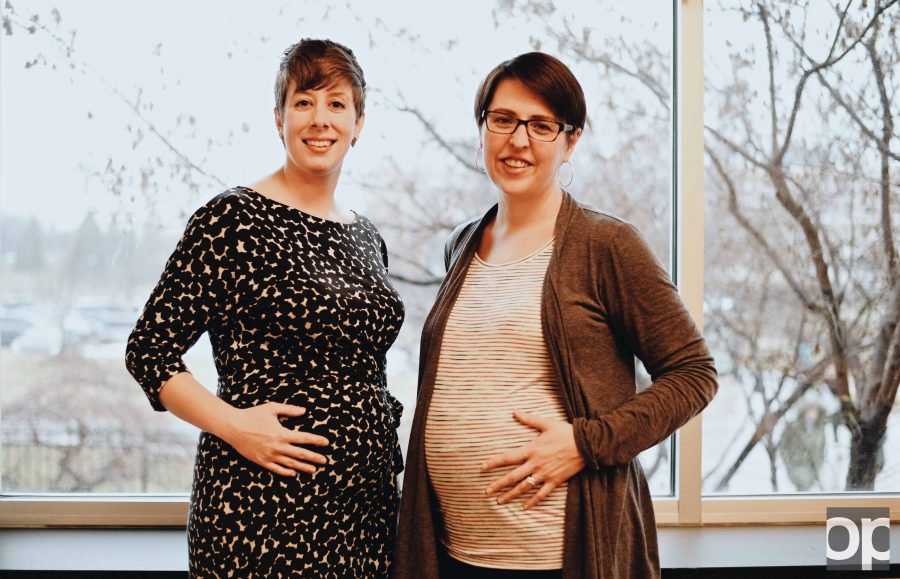What to expect when you’re expecting: A faculty dilemma
Faculty members Joanne Freed (left) and Erin Meyers (right) will both be taking maternity leave soon.
Oakland University has come a long way from its former 1957-self, but why do the university’s modern maternity leave policies still reflect an archaic style of thought?
Currently, no standard university-wide procedure exists for women who are expecting. Rather, the decision rests with the deans and chairs of each department.
At Oakland, the only major break an expecting parent receives is from the Family and Medical Leave Act. Passed with bipartisan support in 1993, the FMLA entitles eligible employees of covered employers to take an unpaid, 12-week job-protected leave for specified family and medical reasons while remaining covered by health insurance.
Sure, this may sound wonderful, but with semesters that are 16 weeks long, faculty seeking FMLA support face other complications, as well.
Jeff Youngquist, chair of the Department of Communication and Journalism, encounters these issues first hand.
“There is no maternity leave policy,” Youngquist said. “There are things that we do, but there is no formal maternity leave. The university does not have what you would call ‘a maternity leave policy.’ It is a problem for the faculty because it is unpaid, first of all — think about what that would be like with a newborn.”
Youngquist also commented on the existing difficulties with current practices.
“A 12-week leave never quite works right, so we have to think up things to accommodate,” he said. “[Faculty] come back to work, but what do they do? We can’t just stick them in a classroom halfway through the semester, or conversely take them out. What we’ve done here is develop service projects, ‘service’ meaning things that can be done administratively to help the department.”
Although faculty members returning from maternity leave are assigned these projects, there are still issues regarding the actual type of work that will be performed.
“We have to come up with something for each person each time this occurs,” Youngquist said. “There is no consistency. Every time a pregnancy occurs, it is a whole new thing we have to figure out. We need something better. We could have something better. Many institutions out there have maternity leave policies that are more compassionate than what we have here, which is nothing.”
Jennifer Heisler, former chair of the department, has conducted scholarly research in the area of academic motherhood and has also dealt with Oakland’s maternity leave instructions personally.
“Usually the process goes: the faculty member tells the department chair, the department chair and/or the faculty member goes to Academic Human Resources, which then lays out the FMLA contract,” Heisler said. “Then, the chair goes to the dean of the certain college, and finally, the two discuss a service project that the faculty member can perform in order to be compensated for the remaining four weeks when the individual returns.”
Heisler expanded on the service project details.
“The chair then comes back and informs the faculty member about the decision regarding the service project,” she said. “The faculty member is then left with the decision of either saying ‘Yes,’ or saying ‘No,’ but then not being paid because of the declination. It’s really unfair because it means that the process is dependent on the goodwill of your chair and the goodwill of your dean. There is absolutely no standard for what women are asked to do for that paycheck.”
Heisler also offered her thoughts on the existing faculty contract.
“Everything about being a faculty member with Oakland is governed by our contract with the university,” she said. “It could cover the issue of maternity/paternity leave, but it doesn’t. I do know that it has been passionately brought to the bargaining table in the past two negotiations, but unfortunately, the language was not included in our final contracts. Ultimately, the burden is placed on the family to manage and make up the income that is lost.”
Many colleges sprawled across the state have better provisions for expecting parents, including the University of Michigan, Michigan State University and Grand Valley State University.
Via email, Libby Ciliberti, OU’s chief human resources officer, pinpointed possible scenarios currently available to faculty.
“Oakland University may provide employees paid leave during the 12 weeks FMLA,” Ciliberti said. “The amount of paid leave varies depending upon the employee group and related accrual policies. These paid leaves can go up to six months.”
Ciliberti added that, during the leaves, employee staff positions are held open for six months, unless special circumstances would result in adverse impact to university operations. Faculty may also be approved for unpaid leave for lengths of up to one year for reasons including child care.
She provided further information regarding leaves in a digital brochure published by OU, titled “Academic Human Resources for Work-Life Satisfaction.”
Despite the idyllic possibilities laid out by Academic Human Resources, the benefits that faculty actually receive contrast widely.
Erin Meyers, an associate professor of communication at Oakland, is currently expecting and identified some problems with current policies.
“I think it is very frustrating,” she said. “I know several other women on campus who are pregnant and due similar times to myself, and we all talk with one another to make sure we are all getting the same kind of benefits because that’s really the only resource we have. We don’t have vacation and sick days as faculty members, so you can’t amass those to extend your leave in any way, unlike the corporate world.”
Meyers reiterated the ambiguity within current practices.
“It is frustrating because you get this basic checklist from the university, work it out and then it’s all nebulous,” Meyers said. “I’ve been at other institutions, never taking advantage of the leave, but knew of people who did that got entire semesters off. It’s really up to the whim of the department and the dean.”










